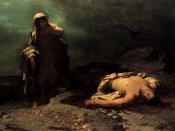The Greek's laws, beliefs, and morals were established to create a better society for all. Both the King and his subjects must abide by these laws, which were constituted by the great gods. If one were to defy the King's and/or the god's rules, they would be punished. Many times, people's values and ethics collide with the edicts that were set by the Ruler. Some would believe that the Rulers' laws were contrary from those of the gods', while the King feels that he was valid and following under the gods' laws. Sometimes Rulers are overwhelmed by their power that they don't realize their faults. In the play Antigone, written by Sophocles, Creon, the King of Thebes, learns how his laws and decisions affected his family, the citizens, and the State. The citizens of Thebes must abide by Creon's rules. Sometimes the people of Thebes don't agree with some of his edicts but they are too afraid to tell him.
One person was courageous to rebel against Creon's laws and that was Antigone, Creon's niece.
Antigone's values and family are very important to her. She tells Ismene, "I shall rest, a loved one with him whom I have loved"ÃÂ (P.84). Antigone loves her brother, Polyneices, very much. If it were one of her other siblings she would have done the same thing. When Polyneices was left unburied, Antigone feels justified, as his sister, to give him a proper burial even if it is against her uncle Creon's rules. Antigone, as a citizen of Thebes, does not follow Creon's new rules because she said, "it was not Zeus who had published that edict"ÃÂ(P.91). Zeus, the King of the Gods, did not establish Creon's laws. She also says to Creon, "Nor did I deem that your decrees were of such force...


